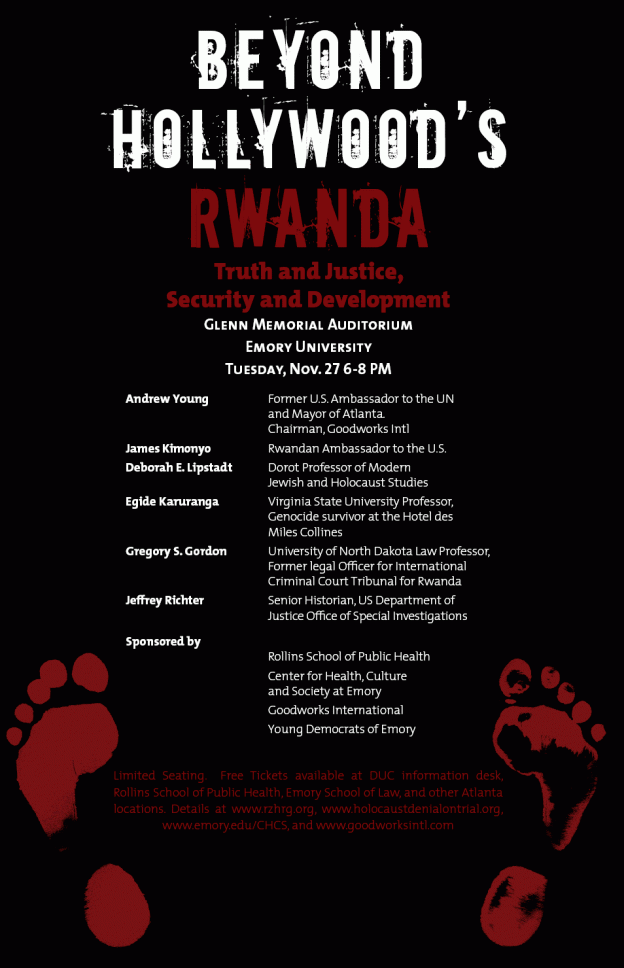By Simran Jain
11/12/07
A group of Emory faculty members who opposed allowing the “Hotel Rwanda” figure Paul Rusesabagina to speak unopposed at State of Race last month has organized a follow-up event to present other views on the Rwandan genocide.
The event, scheduled for Nov. 27, is titled “Beyond Hollywood’s Rwanda: Truth and Justice, Security and Development after the 1994 Genocide,” will be a panel discussion about Rwanda. Susan Allen, professor of global health at the Rollins School of Public Health, said Rusesabagina is a “genocide denier” who has misrepresented the facts of the 1994 genocide for political purposes.
“You have to be a critical thinker. Just because he says things, doesn’t mean it’s true,” she said. “That’s how this panel began. It’s not ‘let’s bash Paul,’ it’s, ‘let’s tell the truth.’” In the past, College Council’s annual State of Race address has featured a panel of experts, not one person speaking unopposed.
“The contract Emory signed with Rusesabagina really went against the spirit of the State of the Race,” said Professor of Anthropology and Global Health Peter Brown, another organizer of the November event.
“If $20,000 of our tuition money went towards this man making political-ethnic tensions worse, then you’re putting $20,000 in the war chest,” Brown added. “We don’t know for sure, but these are things to be concerned about.” One panelist will be former U.S. Ambassador to the United Nations Andrew Young, who produced a documentary called “Rwanda Rising” about the genocide.
Other panelists will include Egide Kauranga, a Virginia State University business professor and genocide survivor who took refuge at Rusesabagina’s Milles Collines Hotel; Emory’s Dorot Professor of Jewish Studies Deborah Lipstadt, a Holocaust scholar; and Rwandan Ambassador to the United States James Kimonyo.
In a letter to University President James W. Wagner in September, Kimonyo objected to the selection of Rusesabagina for State of Race.
“Unfortunately, Paul Rusesabagina is not an individual who enjoys the status of a genocide hero in Rwanda,” he wrote. “Rather, he has used his celebrity status to promote his personal agenda by advancing a theory of divisionism, one of the root causes of the 1994 genocide.”
Allen, who has been conducting research on AIDS in Rwanda since 1994, said she is very familiar with the events prior to, during and after the genocide. She said her goals concerning the upcoming panel discussion include dispelling the myths around Rusesabagina and raising awareness that the criminals responsible for the genocide are still at large in countries including the United States.
Allen said she hopes to see 100 “category one” criminals — genocide planners and organizers — brought to justice before the International Criminal Tribune for Rwanda.
“This is not just about bringing to justice the guys responsible for the genocide, but preventing them from starting it again,” Allen said.
The Nov. 27 panel discussion will be sponsored by the School of Public Health, Emory’s Center for Health, Culture and Society, Young’s Goodworks International, which promotes investment in Africa, and the Young Democrats of Emory.
Young Democrats Co-President Jeremy Barr said he approached Allen about the group co-sponsoring the panel discussion after hearing about the controversy surrounding Rusesabagina. He wanted more information, he said.
“This is not a protest event to the State of the Race event, it’s just a different opinion backed by credible experts in different fields,” Barr said.
Allen hopes that other universities will join the initiative to stop Rusesabagina from talking on other campuses unopposed.
Allen said Rwanda’s situation is the least complicated of all the African conflicts currently happening.
“If we can’t get Rwanda right, we don’t have a prayer in Darfur,” she said.


